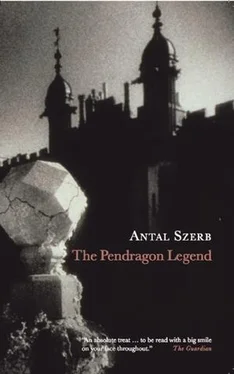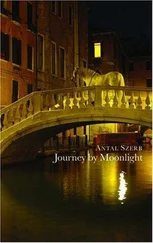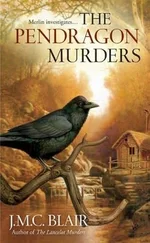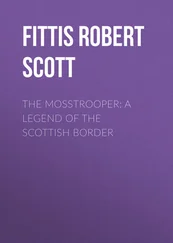And we waited. Not because we had much hope; we just couldn’t find anything better to do. Osborne had slumped into an ancient armchair and gone silent. Cynthia quietly sobbed, and Lene comforted her. I felt like a man whose insides had become paralysed. I couldn’t think of anything constructive, and had nothing to say. I just kept telling myself it was too late: too late for everything.
The rain drove down steadily. Giant mushrooms were growing in the woods; slowly the flora of decay was covering everything. Evil had been unleashed, and the last bastion had fallen. The Satanic kidnapper would continue to haunt the mountains, and the one person who might have stood up to him was dead …
“They threw them into Llyn-Coled,” Cynthia suddenly burst out. “The English Lords of the Marsh, took them there, the five hundred Welshmen. It was in the days of Llewellyn ap Griffith … Ever since then, the Lake has been grieving in Welsh.”
In the end it was Lene who could bear to wait no longer.
“No. We must do something. After all, we’re in a civilised country. This isn’t Maeterlinck’s Castle. The police … Where’s the nearest police station?”
“In Bala,” Osborne replied. “We could get there in an hour by car.”
“Yes, we must go there. To warn the police and the military. We can’t just sit here like this. We should have gone ages ago.”
“But how do we get there?” I asked. “Mr Mansfield, does anyone in the village have a car?”
“No one, sir. It’s rather old-fashioned around here.”
“Or a carriage?”
“There could be. Apple wagons, the sort farmers use.”
“How far is the nearest place where we might find a mechanic to repair the car?”
“Well, it depends, sir. There are many sorts of place in the world, and Merioneth is very large.”
“True. But which is the nearest?”
“As I say, that depends, sir. By cart, the nearest is Abersych. On foot, Betws-y-teg.”
“Why is that?”
“The road to Betws-y-teg goes all the way round the mountain, but the footpath cuts straight across it. You can walk it in an hour and a half.”
“And in which of the two would there be a car?”
“In both. Merioneth is a rich county.”
“Then to be on the safe side, we’d better go to both, and meet at the police station in Bala. Mr Mansfield will kindly get us a cart to take us to Abersych, and one of us will go on foot over the mountain to Betws-y-teg.”
My suggestion was accepted, and Mr Mansfield hurried out to look for one. Now we had to decide who would ride in it, and who would walk. By this stage we realised that poor Cynthia was in such a state she would have to remain where she was. She had taken no part in the discussion; she had just sat shivering and trembling in a corner. Since we couldn’t leave her on her own, Lene would have to stay too, as the only one who could do anything to calm her. However Lene also undertook to arrange for the broken-down car to be transported home, should we not return.
That left Osborne and myself. The more practical thing would have been for him to do the walking. As an athlete and a native he would more easily find his way about. He then confessed, rather ashamedly, that on the last part of the journey he had sprained his foot and didn’t think he could use it for another hour and a half.
We ate some of the cheese to give us strength.
Meanwhile Mr Mansfield had returned with the cart, and Osborne set off for Abersych. I took my leave of Cynthia, who sat staring straight ahead, apathetically, said goodbye to Lene, and went out with our host.
The old man accompanied me to the far end of the village, pointed out the path and explained the route I was to take. I was unhappy from the start. The explanation took the form that I was at various times to pass through a beech wood, then one of birch; and an oak wood would also play a major role. But I, alas, had been city bred from a child, and had studied only the liberal arts. I had never been able to tell one tree from another.
However I dared admit none of this to Mr Mansfield. I took my leave of him and set off on my journey. In the final analysis, I thought, all I had to do was go over the mountain.
At first it was plain sailing. The importance of my mission and the sense of being on a real adventure filled me with childish pride. Whistling cheerfully, I progressed up the slope with rapid strides. I thought there would be some sort of view from the top to show me the way. By the time I got there I was thoroughly exhausted. Only then did I realise that there was not just a single peak, but several, one after the other: it was only from lower down that they appeared to be a single feature. And it was growing steadily darker.
I went over to a tree and tried to determine what sort it was. I couldn’t. It was a tree, a generalised tree.
Never mind, I thought, just keep straight on ahead. I lit a cigarette and started downhill, in the direction that seemed to me to be a continuation of the way I had come. But I had some misgivings. I knew that as a rule my intuitions of this sort were seldom reliable.
Nonetheless, I pressed on regardless. It was only when I had come down from the ridge into a valley and found that the peak facing me was altogether too craggy and precipitous for me even to think of climbing it, and there was no sign of a path leading upwards, that I started to worry. The old man had said a regular, and easily visible, path went all the way to Betws-y-teg. I was obviously lost.
The best thing of course would be to go back and look for the track at the top. But a Roman does not retreat. And to climb a steep hill one had only just finished coming down presented certain psychological difficulties.
In the little valley where I stood, a path wound away to the left. Perhaps if I followed that I’d be able to work my way round the mountain and get off it somewhere. So I set out again.
Meanwhile darkness had descended. Not pitch darkness: the clouds had dissipated, and a crescent moon and some stars had appeared. I made my way ‘by the uncertain light of the moon’, as Virgil puts it, and I felt the full force of that magnificent epithet ‘uncertain’.
It was all utterly confusing. At the back of my conscious mind lurked the anxieties of the actual world: what might be happening to the Earl, and what would be the outcome of this adventure. But in reality I could think of nothing but the complete uncertainty of my route, and what direction I should take. And the only thought I had on that subject was to follow my instincts, however unhappy and uncertain they might be.
I am not exaggerating their demerits. For the first fortnight after arriving in London I lost my way back to the hotel every single day, though it was a mere ten minutes’ stroll. What hope had I now of finding my way in the great Celtic Forest, where I had never been before? My situation was as comically painful as it had been at school when the maths master got carried away, deriving one formula after another and covering the entire blackboard in scribbles, while we grinned and sniggered at one another in despair, having lost him at the second step he had taken.
My spirits steadily sank. The forest was becoming more and more hostile as my weariness grew and the darkness deepened. I was forced to sit and rest briefly on a tree stump. I lit a match and looked at my watch. It was eight o’clock. I had been walking for a whole hour.
When I looked at my watch again it was eight-thirty; the next time it was nine. I sat down, then stood up again. I pushed on stubbornly and miserably, and always it seemed to be through the same bit of forest.
At last I caught a glimmer of light, and hastened towards it. Ahead of me lay a sort of luminous clearing. As I drew closer I realised it was a lake reflecting the moonlight. The trees dipping their branches in the water conveyed an inexpressible grief, and the little reeds endlessly sighed.
Читать дальше












